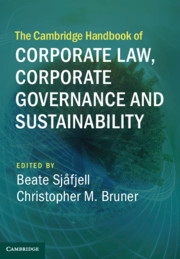Book contents
- Reviews
- The Cambridge Handbook of Corporate Law, Corporate Governance and Sustainability
- The Cambridge Handbook of Corporate Law, Corporate Governance and Sustainability
- Copyright page
- Dedication
- Contents
- Contributors
- Forewords
- Preface
- Introduction
- Part I Global Business and Fragmented Regulation
- Part II Corporate Law, Financial Markets and Sustainability
- Part III Corporate Law, Corporate Governance and Sustainability: Case Studies
- 10 Progress Is Possible
- 11 Green but Not Enough
- 12 The Australian Paradox
- 13 Moving beyond Virtue Signalling
- 14 The EU as a Potential Norm Creator for Sustainable Corporate Groups
- 15 Market-Led Sustainability through Information Disclosure
- 16 Law, Culture and Sustainability
- 17 Stakeholder Value versus Corporate Sustainability
- 18 Worker Participation, Sustainability and the Puzzle of the Volkswagen Emissions Scandal
- 19 Corporate Sustainability and Shareholder Activism in the Netherlands
- 20 Old-Fashioned yet Innovative
- 21 The Unsuccessful Pursuit for Sustainability in Italian Business Law
- 22 Sustainability and the Transformation of the Socialist Corporation into the Private Corporation
- 23 Limited Demand, Limited Supply
- 24 The Pacific Alliance
- 25 Social Environmentalism and Corporate Capture
- 26 The Social and Ethics Committee
- 27 Reforming the Nigerian Oil and Gas Sector
- 28 Enlightenment or Resistance?
- 29 The Community Company as a Vehicle for Sustainability in Solomon Islands
- 30 What Does It Mean to Be Sustainable?
- 31 Shareholder Voting and Corporate Sustainability in China
- 32 Corporate Governance Reform, Social Norms and Sustainability in Japanese Companies
- 33 Achieving Sustainable Development Goals in India
- 34 Sustainability and Legislated Corporate Social Responsibility in Indonesia
- 35 Islamic Financial Institutions and Corporate Sustainability
- 36 Leaders or Laggards?
- Part IV Potential Drivers for Change
- Conclusion
- Index
34 - Sustainability and Legislated Corporate Social Responsibility in Indonesia
from Part III - Corporate Law, Corporate Governance and Sustainability: Case Studies
Published online by Cambridge University Press: 25 November 2019
- Reviews
- The Cambridge Handbook of Corporate Law, Corporate Governance and Sustainability
- The Cambridge Handbook of Corporate Law, Corporate Governance and Sustainability
- Copyright page
- Dedication
- Contents
- Contributors
- Forewords
- Preface
- Introduction
- Part I Global Business and Fragmented Regulation
- Part II Corporate Law, Financial Markets and Sustainability
- Part III Corporate Law, Corporate Governance and Sustainability: Case Studies
- 10 Progress Is Possible
- 11 Green but Not Enough
- 12 The Australian Paradox
- 13 Moving beyond Virtue Signalling
- 14 The EU as a Potential Norm Creator for Sustainable Corporate Groups
- 15 Market-Led Sustainability through Information Disclosure
- 16 Law, Culture and Sustainability
- 17 Stakeholder Value versus Corporate Sustainability
- 18 Worker Participation, Sustainability and the Puzzle of the Volkswagen Emissions Scandal
- 19 Corporate Sustainability and Shareholder Activism in the Netherlands
- 20 Old-Fashioned yet Innovative
- 21 The Unsuccessful Pursuit for Sustainability in Italian Business Law
- 22 Sustainability and the Transformation of the Socialist Corporation into the Private Corporation
- 23 Limited Demand, Limited Supply
- 24 The Pacific Alliance
- 25 Social Environmentalism and Corporate Capture
- 26 The Social and Ethics Committee
- 27 Reforming the Nigerian Oil and Gas Sector
- 28 Enlightenment or Resistance?
- 29 The Community Company as a Vehicle for Sustainability in Solomon Islands
- 30 What Does It Mean to Be Sustainable?
- 31 Shareholder Voting and Corporate Sustainability in China
- 32 Corporate Governance Reform, Social Norms and Sustainability in Japanese Companies
- 33 Achieving Sustainable Development Goals in India
- 34 Sustainability and Legislated Corporate Social Responsibility in Indonesia
- 35 Islamic Financial Institutions and Corporate Sustainability
- 36 Leaders or Laggards?
- Part IV Potential Drivers for Change
- Conclusion
- Index
Summary
Indonesia is the fourth most populous country in the world and a growing economic powerhouse. Although founded in 1949, it has a significant legal history and distinct legal systems based on race. In this historical context, Indonesia has seen economic boom, bust and reform as well as a more recent change from dictatorship to democracy. This chapter reviews the rich and complex history that sets the foundation for the subsequent analysis of the post-Suharto regulatory efforts to address sustainability. The chapter includes three substantial case studies examining how the central government’s mandatory sustainability for State Owned Enterprises has fared.
- Type
- Chapter
- Information
- Publisher: Cambridge University PressPrint publication year: 2019
- 3
- Cited by

